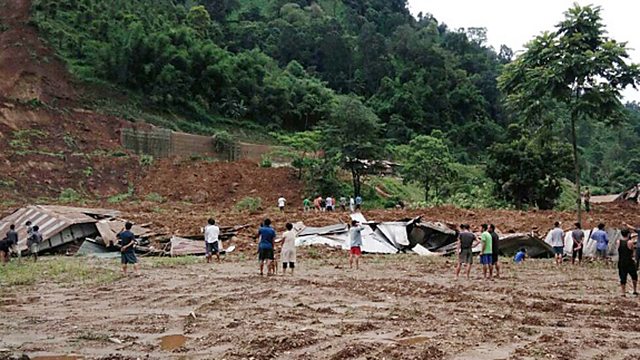
Landslide Warnings
Landslide warnings; Growth in E-waste; the effects of coffee; palaeontologists vs Trump; New Horizons; mobile tech for Rohingya refugess; 3D Printed Kidney; children's willpower
New research has begun to look at ways to offer early warnings of landslides in the mountainous regions of south west India. The Western Ghats region suffer regular and deadly landslides, partly because they encounter a double monsoon season each year. An early warning system that factors in weather, topography and the geology of the region is being developed, as Helen Reeves, Science Director at the British Geological Survey, explains to Roland Pease.
Growth in Global E-waste
A new report on global e-waste, discarded products with a battery or plug, shows 44.7 million metric tonnes generated in 2016 - up 8% from 2014. Gareth Mitchell talks to one of the report’s authors, Ruediger Kuehr, from the United Nations University.
Caffeine: Good or Bad?
Some people love to start their day with caffeine. But what are the impacts on our body? Reporter Alison van Diggelen talks to Stanford University drug and addiction expert Professor Keith Humphreys, and Professor Matthew Walker, who runs a sleep lab in Berkeley, California – a state which just loves its coffee.
Palaeontologists suing Trump
President Donald Trump wants to downsize two US national monuments in Utah. The Society of Vertebrate Paleontology is against lifting this protective status, as “Bears Ears” and “Grand Staircase –Escalante” include some of the most important sites in the world for vertebrate fossils. We hear from David Polly, President of the society.
New Horizons
The American space agency's New Horizons mission has struck gold again. After its astonishing flyby of Pluto in 2015, scientists have just discovered that the probe's next target is not one object but very likely two. Science Editor Jonathan Webb from ABC Radio National in Australia has been speaking to Alan Stern from the New Horizons team.
MSF Using Tech to Aid Rohingya People
Médecins Sans Frontières (MSF) has been helping refugees and other displaced Rohingya in targeting disease and providing medicine and aid. Gareth Mitchell talks to Sam Taylor from MSF about how technology is helping.
3D Printed Kidney
By printing bio-ink on silicone scaffolding, a team at Harvard in the US can print the intricate components of an artificial kidney which can filter blood and produce urine. The work is still at the early stages, and an entire 3D printed kidney is still a way off. Applications and potential for clinical medicine could be a new kind of dialysis for people with kidney failure, as well as being able to safely test whether new drugs damage the kidney. Roland Pease reports.
Children's Willpower
The popular image of children is that they have short attention spans and want everything right now. But a new analysis of 50 years of data from the Marshmallow Test - a classic test of self -control suggests that children are getting better at delaying gratification. John Protzko of University of California Santa Barbara explains why it's happening to Claudia Hammond.
(Photo caption: Indian villagers look on during a rescue operation at the site of a landslide in Laptap village in the Papum Pare district of the state of Arunachal Pradesh on July 11, 2017 – credit: STR/AFP/Getty Images)
The Science Hour was presented by Gareth Mitchell with comments from Science Editor Jonathan Webb from ABC Radio National in Australia
Producer: Katy Takatsuki
Last on
More episodes
Previous
Next
Broadcast
- Sat 23 Dec 2017 12:06GMT����ý World Service Americas and the Caribbean
Podcast
-
![]()
Unexpected Elements
The news you know, the science you don't

